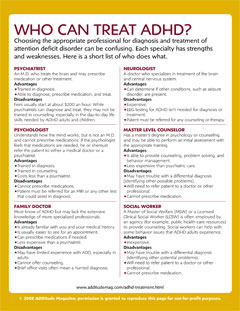A Fuzzy Diagnosis
It is not easy to diagnose ADHD. Unlike diabetes or heart disease, ADHD can’t be detected with a blood test or scan. “Like other psychiatric diagnoses, the boundaries of ADHD are fuzzy, so clinician judgment plays a big role,” says Joel Nigg, Ph.D., a professor of psychiatry, pediatrics, and behavioral neuroscience at Oregon Health & Science University.
Adding to the difficulty is the fact that there is little formal training on ADHD in medical school. “Most professionals do not have sufficient information about how to assess ADHD and treat it,” says Thomas Brown, Ph.D., an assistant clinical professor of psychiatry at Yale University School of Medicine.
So what is the best way to get an accurate diagnosis? While there is no single test to check for ADHD, there are several assessments that can guide a skilled clinician to making an accurate diagnosis.
Erika Merrill Braga, 45, can remember having problems with her attention span since she was a child. “I can remember back to third grade,” she says. “I was messy and all over the place.” Erika’s parents took her to several counselors to figure out why she was having difficulty in school, but no one was able to pinpoint a medical problem. “They said I wasn’t motivated enough or was lazy.”
The problems continued into adulthood. Erika, who lives in Westport, Massachusetts, had trouble completing tasks at work and staying organized at home. She spoke to several psychologists and physicians, even presenting them with the idea that she may have ADHD, but they all believed she was depressed. “My primary-care physician told me that adults don’t have ADHD,” she says.
Persistence paid off, however, when Erika found a licensed mental health care provider at a public clinic to see her. After a two-hour evaluation, Braga was told she had inattentive-type ADHD. “I felt like someone had given me a million-dollar check,” she says. “It was validation.”
Start Here
In many cases, a family doctor is the first person to consult with if you suspect that you or your child has ADHD. He or she can do some initial testing to rule out medical conditions that act like ADHD, such as low iron levels and thyroid imbalances. “Make sure your child is healthy before you see an ADHD expert,” says Nigg.
Don’t pressure your doctor to make a diagnosis. That is how incorrect diagnoses get made. “Parents insist on something being done, so the pediatrician feels that he needs to act,” adds Nigg. If your physician starts to write a prescription for ADHD medication, stop him and insist on a follow-up with an expert in diagnosing ADHD.
Finding a qualified ADHD expert isn’t easy. If your physician cannot suggest someone, contact your local chapter of CHADD (chadd.org) for advice on the best local experts. The best ADHD specialist — whether he or she is a psychiatrist, psychologist, pediatric neurologist, or something else — will have had years of experience in diagnosing and treating ADHD. Adults need an expert who has experience with adult ADHD, which can be harder to diagnose. “There’s a lack of trained people to talk to adults,” says William Dodson, M.D., a psychiatrist from Denver, Colorado.
The first meeting with an ADHD expert should be lengthy. It should start with a long discussion to help her get to know you or your child, and it should take a detailed look at the problems and challenges that brought you to her office.
“The best tool for a clinician is a well-conducted interview with the patient and parent,” says Brown. “An expert will want to find out about how the child does in a range of activities.” (For a list of questions to expect, see “Interview with the Patient.”)
It’s important to be honest and open when answering questions. “It’s always difficult for a clinician if the parent won’t admit that the home life needs improvement,” says Nigg. A recent family event, a move or divorce, for example, can cause behavior problems in a child that have nothing to do with ADHD. Based on this interview, each expert may use a different set of tools to further evaluate a child and whether his difficulties indicate an ADHD diagnosis.
Guides, Books, Rating Scales
The American Psychiatric Association’s Diagnostic and Statistical Manual of Mental Disorders (DSM) is the standard reference guide for mental health disorders. This book provides a checklist for health-care providers to use in assessing someone for ADHD. The newest version of the DSM checklist contains two categories, inattention and hyperactivity/impulsivity, each with a list of nine symptoms that a person with ADHD may exhibit. According to the DSM, a child under the age of 17 with ADHD will display six or more of the symptoms in either category for at least six months. “The DSM checklist is a guide, but I wouldn’t make a diagnosis based on it,” says Brown. “There are some people with ADHD who are not going to have all six of the symptoms required by the DSM for diagnosis.”
For adults, the DSM is less helpful. Experts agree that an adult needs to meet only four of the nine criteria to signal that he may have ADHD. “The DSM is an inadequate tool to diagnose an adult,” says Dodson. For preschoolers, the DSM is even less helpful. For those children, “you want to take the diagnosis process slowly, with someone who specializes in treating that age group,” he says.
For children under the age of 16, a clinician may use a standardized rating scale to make a further assessment. There are various rating scales available, but they all consist of long surveys to be completed by the parent, the child’s teacher, and, sometimes, the child himself. The goal of these rating scales is to compare everyone’s opinion of a child’s abilities in a structured way. Rating scales help a clinician assess whether a child has ADHD, its severity, and whether the child has an additional disorder that affects his or her performance in the classroom.
Susan Scarpiello first saw her pediatrician when her son, Frank, began having difficulty following directions and interacting with his peers, at the age of seven. After discussing her son’s problems, Scarpiello filled out a rating scale, and it was quickly determined that Frank did indeed have ADHD. Without hesitation, the pediatrician prescribed stimulant medication.
Medication didn’t help, however. The three medications they tried all left Frank spacey, withdrawn, and pale. “After the third medication, we had enough,” says Scarpiello.
She decided it was time to find someone who specialized in ADHD. She believes that her son has a secondary disorder, as well as ADHD. “He must have ADHD, but there has to be another piece to it,” she says.
This wouldn’t be unusual. “Over 80 percent of ADHD kids have a second disorder, which really complicates the diagnosis of ADHD,” says Russell Barkley, Ph.D., a clinical professor of psychiatry and pediatrics at the Medical University of South Carolina. Anxiety, depression, and learning disorders often go along with ADHD.
Next: Secondary Conditions and High-Tech Diagnosis






